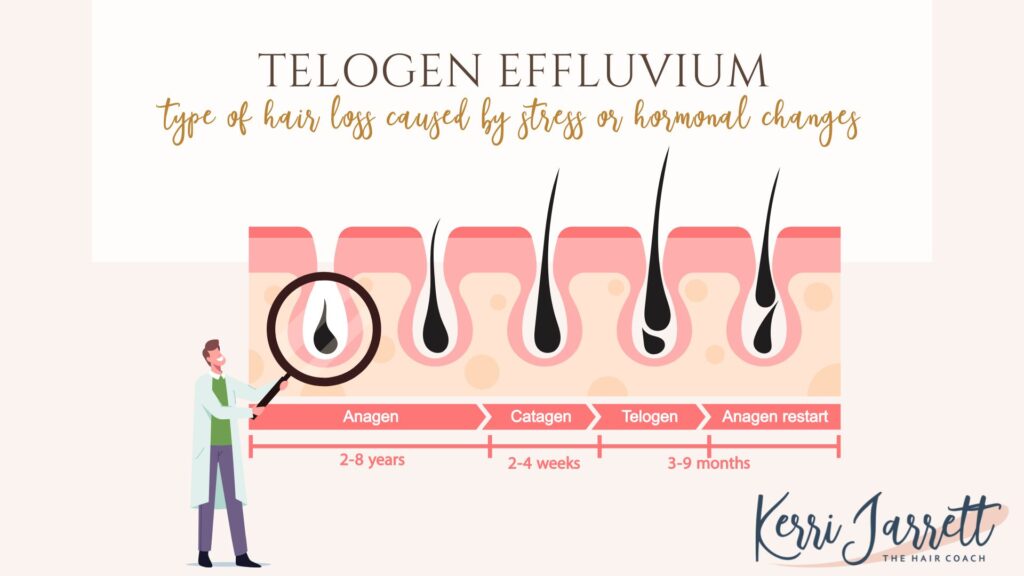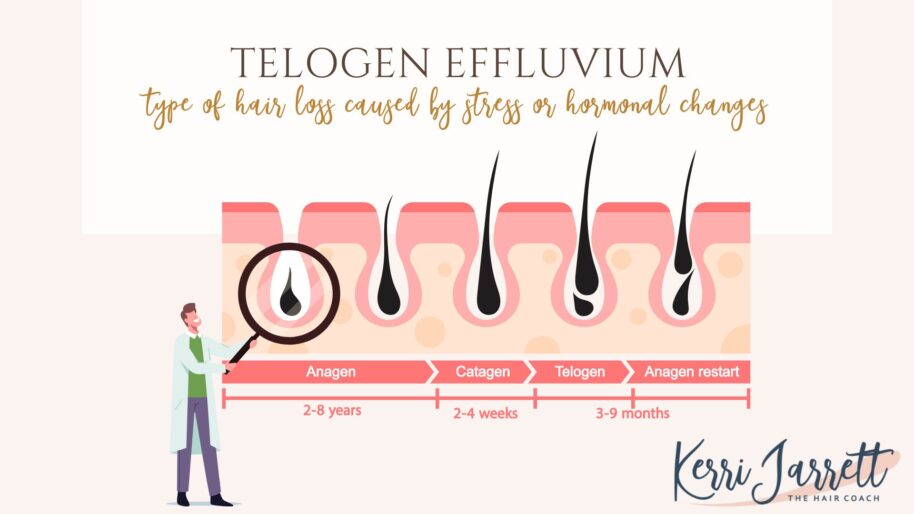Telogen effluvium is a common type of hair loss that is typically caused by stress or hormonal changes. While it can be alarming to experience sudden hair shedding, it is important to know that telogen effluvium is usually a temporary condition and that most people recover fully.
In this blog post, we will explore what telogen effluvium is, its causes, symptoms, and treatment options.
What is telogen effluvium?
Telogen effluvium is a type of hair loss that occurs when a large number of hair follicles enter the resting phase (telogen) of the hair growth cycle at the same time. This leads to increased shedding of hair, which can be noticeable to the individual experiencing it.
While it is normal to shed some hair each day, in telogen effluvium, hair loss is more pronounced and can lead to noticeable thinning of the hair. The condition can affect both men and women of any age.
What causes telogen effluvium?
There are a variety of factors that can trigger telogen effluvium, including:
- Physical or emotional stress: This can include significant weight loss, a high fever, surgery, or emotional stress.
- Hormonal changes: This can include changes in hormone levels due to pregnancy, menopause, or the use of birth control pills.
- Medications: Certain medications, such as antidepressants, beta-blockers, and retinoids, can cause telogen effluvium.
- Nutritional deficiencies: A lack of certain vitamins and minerals, such as iron, zinc, and biotin, can lead to hair loss.
What are the symptoms of telogen effluvium?
The main symptom of telogen effluvium is increased hair shedding, which can be noticed when brushing or washing the hair. This shedding can be diffuse, meaning that hair is lost evenly from all over the scalp, or it can be more pronounced in certain areas.
In some cases, people with telogen effluvium may also experience itchiness or discomfort on the scalp.
How is telogen effluvium treated?
The good news is that telogen effluvium is usually a temporary condition, and most people recover fully without any treatment. However, there are some steps that can be taken to help support healthy hair growth, including:
- Managing stress: Reducing stress levels through exercise, meditation, or other relaxation techniques may help reduce hair shedding.
- Eating a balanced diet: Consuming a diet rich in vitamins and minerals can help support healthy hair growth.
- Avoiding harsh hair treatments: Avoiding chemical treatments, such as coloring and straightening, and heat styling tools may help reduce hair damage.
- Using hair growth products: Some hair growth products, such as minoxidil, can help promote hair growth and reduce shedding.
In some cases, a medical professional may also prescribe medications, such as corticosteroids, to help reduce inflammation and promote hair growth.
Telogen effluvium is a common and usually temporary type of hair loss that is typically triggered by stress or hormonal changes. While it can be concerning to experience increased hair shedding, most people recover fully without any treatment. By managing stress, eating a healthy diet, and avoiding harsh hair treatments, individuals can support healthy hair growth and recovery. If you are experiencing significant hair loss or discomfort, it is always a good idea to speak with a doctor to rule out any underlying medical conditions.
How long does telogen effluvium last?
The duration of telogen effluvium (TE) can vary depending on the individual and the underlying cause. In most cases, TE is a temporary condition that can last for several months, typically between three to six months. However, it’s important to note that some cases of TE may last longer, up to a year or more.
The good news is that most people will see their hair start to grow back once the underlying cause of TE is addressed or resolved. However, it may take some time for the hair to return to its normal density and thickness, as the hair growth cycle takes time.
It’s also important to note that some individuals may experience recurrent episodes of TE, especially if they are exposed to the same triggers that caused the initial episode. Therefore, it’s important to identify and address any potential triggers of TE to prevent future episodes. If you are concerned about hair loss or experiencing symptoms of TE, it’s recommended to speak with a doctor or dermatologist for an accurate diagnosis and appropriate treatment plan.
How do I know if I have telogen effluvium?
If you are experiencing increased hair shedding, it is possible that you may have telogen effluvium (TE). However, there are other conditions that can also cause hair loss, so it is important to speak with a healthcare provider or dermatologist to determine the underlying cause of your hair loss.
Here are some signs and symptoms that may suggest that you have TE:
- Increased hair shedding: One of the hallmark symptoms of TE is increased hair shedding, which may be noticed during washing, brushing, or styling the hair. You may notice more hair in your hairbrush or in the shower drain.
- Diffuse hair thinning: TE can cause diffuse hair thinning, meaning that hair is lost evenly from all over the scalp, rather than in specific areas.
- No obvious bald patches: Unlike some other forms of hair loss, TE typically does not cause obvious bald patches or areas of complete hair loss.
- Previous physical or emotional stress: If you have experienced physical or emotional stress recently, such as a high fever, significant weight loss, or a traumatic event, this may suggest TE as a possible cause of your hair loss.
- Hormonal changes or medication use: TE can also be triggered by hormonal changes, such as during pregnancy or menopause, or by the use of certain medications.
If you are experiencing hair loss and are concerned that you may have TE, it is recommended to speak with a healthcare provider or dermatologist. They can perform a physical examination, review your medical history, and perform any necessary tests to determine the underlying cause of your hair loss and provide appropriate treatment.
Do telogen effluvium hairs grow back?
Yes, in most cases, the hair that is lost due to telogen effluvium (TE) will grow back once the underlying cause of the condition is addressed or resolved. It is important to note that the hair regrowth process can be slow and may take several months to a year to see significant improvement.
During TE, there is a temporary disruption of the hair growth cycle, which causes an increased number of hairs to enter the shedding phase (telogen phase) prematurely. This results in increased hair shedding and a decrease in the overall density of the hair. However, the hair follicles remain intact, and the hairs will begin to regrow once the underlying trigger of TE is addressed.
It’s important to note that some individuals may experience recurrent episodes of TE, especially if they are exposed to the same triggers that caused the initial episode. Therefore, it is important to identify and address any potential triggers of TE to prevent future episodes.
If you are experiencing hair loss and are concerned that you may have TE, it is recommended to speak with a healthcare provider or dermatologist. They can perform a physical examination, review your medical history, and perform any necessary tests to determine the underlying cause of your hair loss and provide appropriate treatment.
How can a Trichologist Help If I Have Telogen Effluvium?
A trichologist is a healthcare professional who specializes in hair and scalp disorders. They can help you if you have telogen effluvium (TE) by providing a thorough assessment of your hair and scalp, identifying any underlying causes of your hair loss, and providing appropriate treatment recommendations.
Here are some ways that a trichologist can help you if you have TE:
- Diagnosis: A trichologist can help to determine whether you have TE or another type of hair loss by examining your scalp and hair, taking a detailed medical history, and performing any necessary tests.
- Identifying underlying causes: TE can be triggered by a variety of factors, such as stress, illness, medication, or hormonal changes. A trichologist can help to identify any underlying causes of your hair loss and provide recommendations on how to address them.
- Treatment recommendations: Once the underlying cause of your TE has been identified, a trichologist can provide personalized treatment recommendations to help promote hair regrowth and prevent future episodes of TE. This may include changes to your diet or lifestyle, topical treatments, or oral medications.
- Support and education: Dealing with hair loss can be challenging and stressful. A trichologist can provide support and education to help you manage your hair loss and promote healthy hair growth.
A trichologist can provide valuable expertise and support to individuals with telogen effluvium. If you are experiencing hair loss and are concerned about telogen effluvium or other hair and scalp conditions, it is recommended to speak with a trichologist or other healthcare provider for an accurate diagnosis and appropriate treatment plan.


